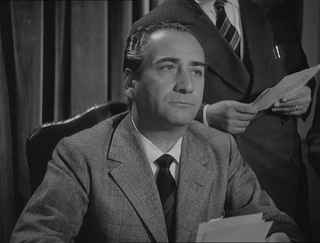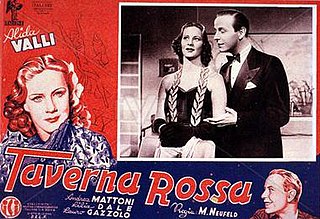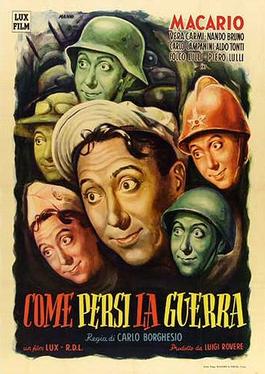Lo vedi come sei... lo vedi come sei? is a 1939 Italian "white-telephones" comedy film directed by Mario Mattoli and starring Erminio Macario. The film's sets were designed by the art director Cinecittà Studios.

Erminio Macario, best known as Macario, was an Italian film actor and comedian. He appeared in 42 films between 1933 and 1975.

Adam and Eve is a 1949 Italian comedy film directed by Mario Mattoli and starring Erminio Macario.

Isa Barzizza was an Italian actress whose career spanned over 60 years.

Guglielmo Barnabò was an Italian stage and film actor. He appeared in more than 90 films between 1926 and 1954.

Vinicio Sofia was an Italian actor and voice actor.

Enzo Garinei was an Italian film actor. He appeared in nearly 80 films since 1949. He was also a professional voice artist, best remembered as the Italian voice of Sherman Hemsley in the American sitcom The Jeffersons. He was the brother of playwright Pietro Garinei.

Nino Marchetti was an Italian film actor. He appeared in 66 films between 1934 and 1973.
Loyalty of Love is a 1934 Italian historical drama film directed by Guido Brignone and starring Marta Abba, Nerio Bernardi and Luigi Cimara. It is based on the story of Teresa Confalonieri, a celebrated figure of the Italian reunification campaign. It was one of several films made during the 1930s that portrayed this era. It premiered at the Venice Film Festival in August 1934.

Red Tavern is a 1940 Italian "white-telephones" comedy film directed by Max Neufeld and starring Alida Valli, André Mattoni, and Lauro Gazzolo. It was made at Cinecittà in Rome. A young woman eventually marries a count after a series of misunderstandings.

To Live is a 1937 Italian musical drama film directed by Guido Brignone and starring Tito Schipa, Caterina Boratto and Nino Besozzi. The film is noted for its title song, composed by Cesare A. Bixio. It was distributed by the Italian subsidiary of MGM.

Lo smemorato di Collegno is a 1962 commedia all'italiana film directed by Sergio Corbucci. It is loosely based on the Bruneri-Canella case.

How I Lost the War is a 1947 Italian comedy film directed by Carlo Borghesio and starring Erminio Macario.

Two on a Vacation is a 1940 Italian comedy film directed by Carlo Ludovico Bragaglia and starring Vittorio De Sica, María Denis, and Umberto Melnati. It was a remake of the 1932 German film Two in a Car. It was shot at the Cinecittà Studios in Rome.

Without a Woman is a 1943 Italian "white-telephones" comedy film directed by Alfredo Guarini and starring Giuseppe Lugo, Silvana Jachino and Umberto Melnati.
Charley's Aunt is a 1943 Italian comedy film directed by Alfredo Guarini and starring Erminio Macario, Carlo Minello and Maurizio D'Ancora.

The Amnesiac is a 1936 Italian comedy film directed by Gennaro Righelli and starring Angelo Musco, Checco Durante and Franco Coop. The film's plot is based on a stage play, inspired by the Bruneri-Canella case. It was shot at Cines Studios in Rome. The film's sets were designed by the art director Mario Rappini.

The Three Wishes is a 1937 Italian "white-telephones" romantic comedy film directed by Giorgio Ferroni and Kurt Gerron and starring Luisa Ferida, Antonio Centa and Leda Gloria.
The Last of the Bergeracs is a 1934 Italian comedy film directed by Gennaro Righelli and starring Ketty Maya, Arturo Falconi and Italia Almirante-Manzini.

Giallo is a 1933 Italian comedy thriller film directed by Mario Camerini and starring Assia Noris, Sandro Ruffini and Elio Steiner. It is based on the 1928 play The Man Who Changed His Name by Edgar Wallace in which a young wife begins to fear that her husband may in fact be an escaped murderer.















